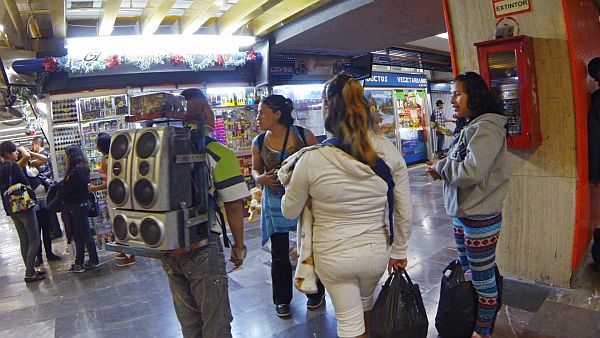Mexico City, Mexico — Boarding the Mexico City Metro once meant squeezing in with dozens of vendors hawking everything from anti-bacterial gel and Jolly Ranchers to a global CD selection. They hawked their wares with painfully loud speakers carried on their backs, sometimes alongside bizarre "street" performances: Shirtless, homeless men being walked on as they lay on a bed of broken glass; off-key singers so bad they ought to have been paid to stop.
It wasn't a subway ride. It was an adventure.
Now the system that ranks among the world's ten largest, carrying more than 1.6 billion riders a year, is civilized by comparison since authorities started cracking down on the side show that was the Metro. Authorities of the Collective Transportation System started in December kicking vendors off some cars. As of Wednesday they were banned on all 12 lines and 162 stations.
"It's the way it's supposed to be," said Jaime Lemus, a rider from Mexico City. "It was horrible, people coming in and bothering people."
In response, several thousand informal vendors — no one has an exact count — have taken their loudspeakers to the streets and to city hall, marching to complain that the Mexico City government is removing their livelihood without providing an alternative. Some marched in balaclavas Wednesday, though it wasn't clear why they hid their identities.
The city has offered them $2,098-peso monthly stipends (nearly $160 USD), requiring that they take employment retraining classes in a variety fields, from hotel work to massage therapy. Vendors say it's not a real offer. Most are not interested in changing careers, and can make more than three times the stipend in a month. So far, more than 2,000 have registered to receive the stipends, but only 967 have enrolled in classes, according to the city's Secretary for Economic Development.
The city also has offered those kicked off the Metro alternative spots to sell legally.
"They're offering us locations where there are no people, places other merchants have abandoned because there are no people," said Juan Jose Hernandez Diaz, who has been selling on the Metro for 25 years. "We can't live on $500 pesos a week. I have a daughter in high school. Her expenses are $100 pesos a day."
Vendors have always been banned from selling in the subway. But in a quintessential combination that makes Mexico City, people who need jobs create their own, and authorities unevenly enforce the laws. It boils down to an economic struggle seen in many venues as recent administrations have tried to tame the chaotic city, home to 8 million residents but some 20 million in the greater metropolitan area.
Because the majority of Mexicans work in the informal economy, cleaning up public areas inevitably puts some out of work.
But authorities insist that selling on the subway is inappropriate.
"The Metro is a means of transport, not a place for selling," said one transit official who wasn't authorized to speak by name about the confrontation.
He pointed to recent polls commissioned by the transit authority in which riders list the vendors as one of their top three annoyances in using the system. The polls were taken around a controversial fare hike from 3 to 5 pesos, (from about 22 to 38 cents,) which took effect in December. Officials promised the additional money would provide more trains, faster service and better security, including kicking out the vendors. Since the fare hike, the transit system not only had a full-on confrontation with vendors, last week it had to close about half the stations on its newest Line 12 because of design flaws.
The city has added at hundreds of new auxiliary police to patrol the platforms and cars. Vendors caught selling have their wares confiscated and even face short-term detention in what the city uses as a drunk tank.
Vendor Rodolfo Aguilera says he wants the government to pool the money it would give in stipends to create permanent stands near the platforms. The city counters that vendors need the capacitation classes to run the stands.
So far, there is no way out of the stalemate.
The vendors continue selling quietly, walking every car, hawking Super Glue, screwdriver kits, "The Art of Forgiveness" books that will "change your life." Now, they hide their wares in giant bags and don't begin calling out until the doors shut, so they aren't detected by police. Even the vendors acknowledge their loud speakers were really annoying.
"It's much better," said Hernandez, who abandoned his speaker three months ago.
It's the only thing the vendors and the city agree on.
Original Story


